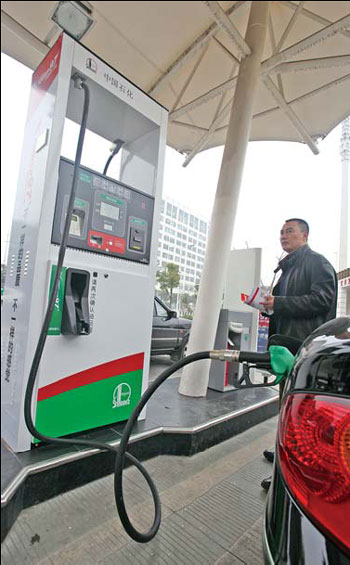Rate of crude oil imports falls
Updated: 2012-01-11 10:24
By Zhou Yan (China Daily)
|
||||||||
BEIJING - As China's economy slowed in 2011, so did the growth rate in the amount of crude oil it was importing.
|
 |
|
According to the China Petroleum and Chemical Industry Association, the proportion of fossil fuels in the country's energy mix will decrease as the development of natural gas and renewable energy is encouraged. [Photo/Provided to China Daily] |
Last year, China imported 253.8 million tons of crude oil, 6 percent more than in 2010, according to figures released by China's customs authority on Tuesday. That growth rate was far below the record rate of 17.5 percent set in 2010.
The average price of imported oil last year was $774.90 a ton, up 37 percent from a year before. The price increase pushed the amount of the country's crude imports this past year up to $196.6 billion, an increase of 45.3 percent from the previous year.
In December, China imported 21.92 million tons of crude oil, down 3.4 percent from November.
China's slower economic expansion last year, coming at a time when various local governments placed limits on vehicle purchases, caused the country's energy demand to decrease, said Niu Li, a senior economist with the State Information Center.
The GDP growth rate dropped each quarter from January to September 2011. An official GDP figure for the year has yet to be released, but many observers estimate that it will be 9.2 percent. In 2010, the country's GDP had increased by 10.4 percent.
China's GDP growth is expected to slow further this year, falling to below 9 percent.
Customs' figures also showed that China imported 4.04 million tons of fuel and diesel in December. That was the most since August 2008, when a widespread shortage of diesel fuel prompted refiners to try to meet the demand by increasing their refining capacity.
The amount of diesel and fuel imported increased for three consecutive months, starting in October.
China has steadily produced 200 million tons of domestic crude oil annually in recent years. The increase in the amount of oil being imported into China, the second-biggest oil consumer after the United States, has been prompted mainly by the country's growing demand for oil.
In 2010, China began importing more than 50 percent of all of the oil it used.
In the long run, the amount of oil, coal and other fossil fuels in the country's energy mix will decrease as the country tightens its controls on carbon emissions and encourages the development of natural gas and renewable energy, said Zhu Fang, deputy director of the information and marketing department at the China Petroleum and Chemical Industry Association.
Liu Tienan, director of the National Energy Administration, said at the National Energy Works Meeting on Tuesday that one of the biggest energy tasks for the country this year will be to make its energy use more efficient.
China adopted initial reforms for its use of natural gas in Guangdong province and the Guangxi Zhuang autonomous region in December.
The reforms are meant to make the system used to set natural-gas prices better reflect the open market. The reforms have the long-term goal of encouraging the development of cleaner fuel and reducing the country's reliance on oil.

 Relief reaches isolated village
Relief reaches isolated village
 Rainfall poses new threats to quake-hit region
Rainfall poses new threats to quake-hit region
 Funerals begin for Boston bombing victims
Funerals begin for Boston bombing victims
 Quake takeaway from China's Air Force
Quake takeaway from China's Air Force
 Obama celebrates young inventors at science fair
Obama celebrates young inventors at science fair
 Earth Day marked around the world
Earth Day marked around the world
 Volunteer team helping students find sense of normalcy
Volunteer team helping students find sense of normalcy
 Ethnic groups quick to join rescue efforts
Ethnic groups quick to join rescue efforts
Most Viewed
Editor's Picks

|

|

|

|

|

|
Today's Top News
Health new priority for quake zone
Xi meets US top military officer
Japan's boats driven out of Diaoyu
China mulls online shopping legislation
Bird flu death toll rises to 22
Putin appoints new ambassador to China
Japanese ships blocked from Diaoyu Islands
Inspired by Guan, more Chinese pick up golf
US Weekly

|

|







